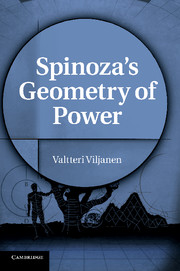Book contents
- Frontmatter
- Contents
- Acknowledgements
- Abbreviations
- Other sources
- Introduction
- Chapter 1 Spinoza on being
- Chapter 2 Causation and geometry
- Chapter 3 Power, existence, activity
- Chapter 4 The derivation of the conatus doctrine
- Chapter 5 The meaning of the conatus doctrine
- Chapter 6 Geometrical dynamics of individuality
- Conclusion
- Bibliography
- Index
Chapter 4 - The derivation of the conatus doctrine
Published online by Cambridge University Press: 07 October 2011
- Frontmatter
- Contents
- Acknowledgements
- Abbreviations
- Other sources
- Introduction
- Chapter 1 Spinoza on being
- Chapter 2 Causation and geometry
- Chapter 3 Power, existence, activity
- Chapter 4 The derivation of the conatus doctrine
- Chapter 5 The meaning of the conatus doctrine
- Chapter 6 Geometrical dynamics of individuality
- Conclusion
- Bibliography
- Index
Summary
There can be no doubt that the concept of striving – conatus – is central for Spinoza’s project: in brief, his psychology and ethics are based on it. Thus it is no wonder that conatus, and via it the concept of power, have increasingly often figured in Spinoza scholarship, on both sides of the Atlantic. My main contribution to this discussion rests on the contention that an adequate understanding of the conatus principle requires seeing it as something that emerges from certain key aspects of Spinoza’s ontology with which we are now familiar. As a matter of fact, conatus is the most prominent manifestation of what I have called Spinoza’s geometry of power, for it is the feature through which Spinoza’s rationalist ontology is applied to temporal existence. Of course, discerning how exactly this happens is no small task, but I believe it is well worthwhile, for the result is a unique and truly compelling view of finite individuality and human agency.
As already noted, the main proposition of the conatus doctrine states: ‘Each thing, insofar as it is in itself, strives to persevere in its being’ (3p6, translation modified). This striving, in turn, is designated as the actual essence of all things, human beings included (3p7); in other words, actual Spinozistic things are all strivers of different kinds. However, Spinoza’s argument for 3p6 has been severely criticized for being defective in many ways. The relevance of all the elements it consists of is by no means evident, and scholars disagree as to which ones are truly important for the main proposition. Also the consistency of Spinoza’s derivation has been questioned. For Spinoza, these accusations are not a minor problem: as it is a central undertaking of his to derive, in geometrical fashion, true ethics from sound metaphysical principles, what is at stake here is nothing less than the overall cogency of his system. Thus, were Spinoza’s arguably most ardent contemporary critic, Bennett, right in claiming that the derivation of the conatus doctrine is ‘irreparably faulty’, it would also be justified to hold, as Bennett does, that ‘[t]he Ethics in fact is broken-backed’. Against this, I will argue that having a firm grasp of Spinoza’s concept of power enables us to discern the argument’s general idea. Further, it seems to me that thus far the structure of the derivation has not been completely correctly understood, so showing how its various ingredients work together is an important task I will undertake. Before all this, however, some general remarks on the doctrine and its historical sources are in order.
- Type
- Chapter
- Information
- Spinoza's Geometry of Power , pp. 83 - 104Publisher: Cambridge University PressPrint publication year: 2011



